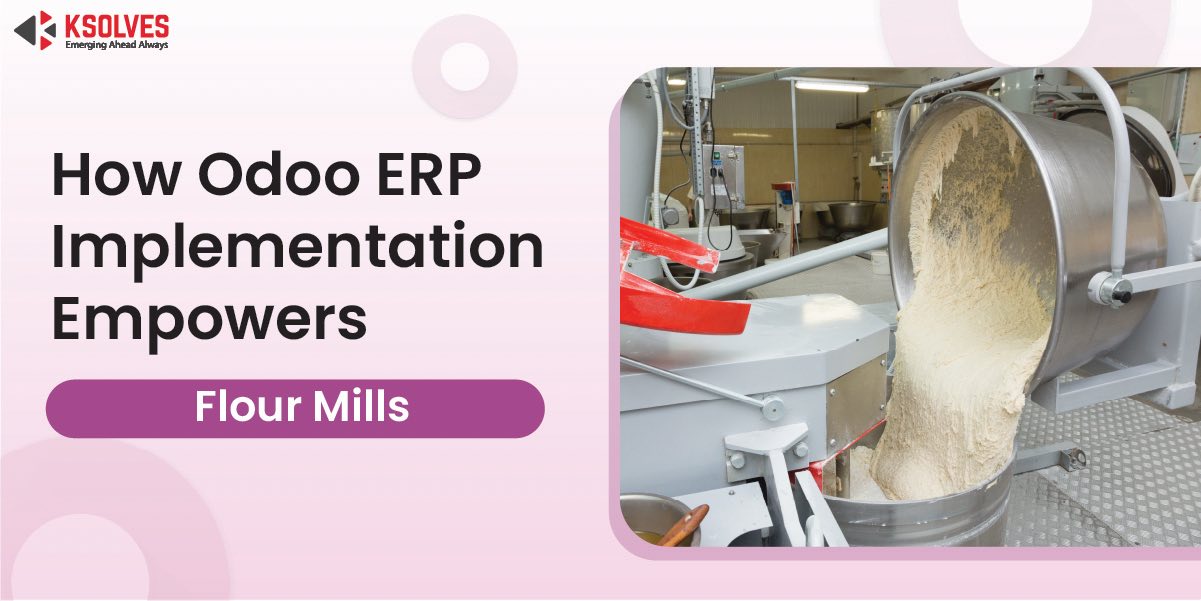Flour mills play a crucial role in the food industry, producing staple ingredients used in a variety of products. However, managing the complex operations of a flour mill can be challenging. From inventory management to production planning, maintaining quality control to managing customer orders, the tasks can quickly become overwhelming. To overcome these challenges, many flour mills are turning to Odoo ERP as a comprehensive solution. In this blog, we will explore how Odoo ERP implementation can revolutionize flour mill business operations and drive efficiency.
Struggles of Operating Flour Mills without ERP Software
Without the guidance and support of a robust ERP system like Odoo, flour mills encounter numerous challenges that hinder their efficiency and growth. Let’s shine a spotlight on the hurdles faced by flour mills operating without an ERP software and understand how Odoo ERP for flour mills can be the game-changer.
Managing inventory in a flour mill can be a complex task. Without an ERP software, tracking and maintaining accurate inventory levels becomes a time-consuming and error-prone process. Flour mills often struggle with stockouts, excess inventory, and challenges in monitoring ingredient availability. This leads to production delays, customer dissatisfaction, and increased costs.
Maintaining consistent product quality is vital for flour mills to uphold their reputation and meet regulatory standards. However, without ERP software, ensuring quality control becomes a daunting task. Manual record-keeping, lack of traceability, and absence of standardized processes increase the risk of quality issues and customer dissatisfaction. The lack of real-time data and analytics further hinders proactive quality management.
- Customer Order Management
Managing customer orders without an ERP software can quickly become chaotic. Manual order processing, relying on spreadsheets, and limited visibility into order status can lead to order errors, delays, and poor customer communication. Flour mills without an integrated system often struggle to provide accurate order tracking, meet delivery deadlines, and maintain customer satisfaction.
One significant challenge faced in flour mill management without an ERP software is the difficulty and time-consuming nature of accounting procedures. Relying on manual processes, such as paper invoices and sales orders, wastes valuable time and leads to potential errors and inconsistencies. The lack of integration between sales and accounting departments further complicates tracking customer relationships and financial transactions. Implementing an all-in-one ERP solution like Odoo streamlines accounting procedures, eliminates manual entries, improves data accuracy, and provides real-time insights, enabling flour mills to make informed financial decisions and drive growth.
Benefits of Odoo ERP Implementation For Flour Mills
- Streamlined Operations & Enhanced Efficiency
Odoo ERP simplifies and automates complex processes in flour mills, eliminating manual tasks and reducing human errors. From inventory management to production planning and customer order processing, Odoo integrates and streamlines operations, ensuring a seamless flow of information and resources. With real-time data visibility, managers can make informed decisions, optimize resource utilization, and drive operational efficiency.
- Accurate Production Planning and Control
Odoo ERP empowers flour mills with effective production planning and control capabilities. With features like demand forecasting, capacity planning, and scheduling, mills can optimize production processes, minimize downtime, and meet customer demands efficiently. Real-time data on machine availability, resource allocation, and production progress enable proactive decision-making, ensuring on-time deliveries and customer satisfaction.
Odoo ERP Implementation for flour mills brings the advantage of better and faster decision-making. By integrating essential processes and collecting data from various departments, locations, and business sectors, Odoo ERP provides a comprehensive view of operations. This real-time data allows decision-makers to analyze trends, identify bottlenecks, and respond promptly to market changes. With accurate information at their fingertips, flour mills can make informed decisions, optimize resources, and stay ahead in the competitive flour milling industry. Odoo ERP becomes a catalyst for efficient decision-making, enhancing agility and competitiveness in flour mills.
- Scalability and Flexibility
As flour mills grow and evolve, Odoo ERP provides scalability and flexibility to meet changing needs. With its modular structure, mills can start with essential modules and gradually expand their Odoo implementation as required. Odoo’s customizable nature allows flour mills to tailor the system to their specific processes and workflows, ensuring a perfect fit for their unique requirements.
- Enhanced Financial Management
Odoo’s integrated financial management module brings transparency, accuracy, and efficiency to financial operations in flour mills. Odoo simplifies financial processes, eliminates duplication of efforts, and provides real-time insights into the financial health of the business. This enables informed decision-making, better cash flow management, and compliance with accounting standards.
Successful Odoo ERP Implementation For Flour Mills
- Pre-implementation Planning
Before implementing Odoo ERP, thorough planning is essential. It involves analyzing existing processes, identifying requirements, forming an implementation team, and setting realistic project goals and timelines.
- System Configuration and Customization
Odoo ERP can be configured and customized to suit the unique needs of flour mills. This includes creating user roles, defining workflows, and integrating with existing systems. Customization ensures that the ERP system aligns perfectly with the specific requirements of the flour mill.
Migrating data from legacy systems to Odoo ERP requires careful planning and execution. Data cleansing, mapping, and validation are crucial steps to ensure accurate and complete data migration. This ensures a seamless transition to the new ERP system.
- User Training and Change Management:
Proper training plays a pivotal role in the successful implementation and adoption of Odoo ERP in flour mills. It is important to provide comprehensive training to all employees who will be using the system. Training sessions should cover the functionalities of Odoo ERP, step-by-step processes for each module, and best practices for using the system efficiently.
Providing ongoing support and guidance after the implementation is also essential. This can include a helpdesk or support team to address any user queries or issues that may arise. Regular feedback sessions and continuous improvement initiatives can help refine the system and optimize its usage for the specific needs of the flour mill.
Role of an Experienced Odoo Partner in Successful Odoo Implementation
The role of an experienced Odoo partner is crucial in ensuring a successful implementation of Odoo ERP for businesses, including flour mills. These partners possess deep knowledge and expertise in Odoo’s functionalities, modules, and customization capabilities. They understand the specific requirements and challenges faced by flour mills and can tailor Odoo ERP accordingly to meet their unique needs.
With their technical proficiency, project management skills, and ongoing support, an experienced Odoo partner ensures a seamless implementation process, optimizing efficiency, productivity, and overall business success. Their guidance and expertise empower businesses to fully utilize the capabilities of Odoo ERP, enabling them to streamline operations, enhance customer satisfaction, and achieve their strategic objectives.
If you are looking for an ideal Odoo partner, Ksolves is your best choice for seamless Odoo implementation. As an Odoo Gold Partner with extensive expertise, industry knowledge, and proven track record, Ksolves can tailor Odoo ERP to meet your unique business requirements. Our commitment to delivering seamless implementations, comprehensive training, and ongoing support ensures a smooth transition and optimal utilization of Odoo ERP.
Close Out
In conclusion, implementing Odoo ERP in flour mills provides a comprehensive solution to the challenges faced in managing complex operations. By streamlining inventory management, ensuring quality control, managing customer orders, and simplifying accounting procedures, Odoo ERP drives efficiency, improves decision-making, and enhances overall operational performance. With its scalability, flexibility, and integrated financial management module, Odoo ERP empowers flour mills to optimize processes, meet customer demands, and stay competitive in the industry.






AUTHOR
Share with